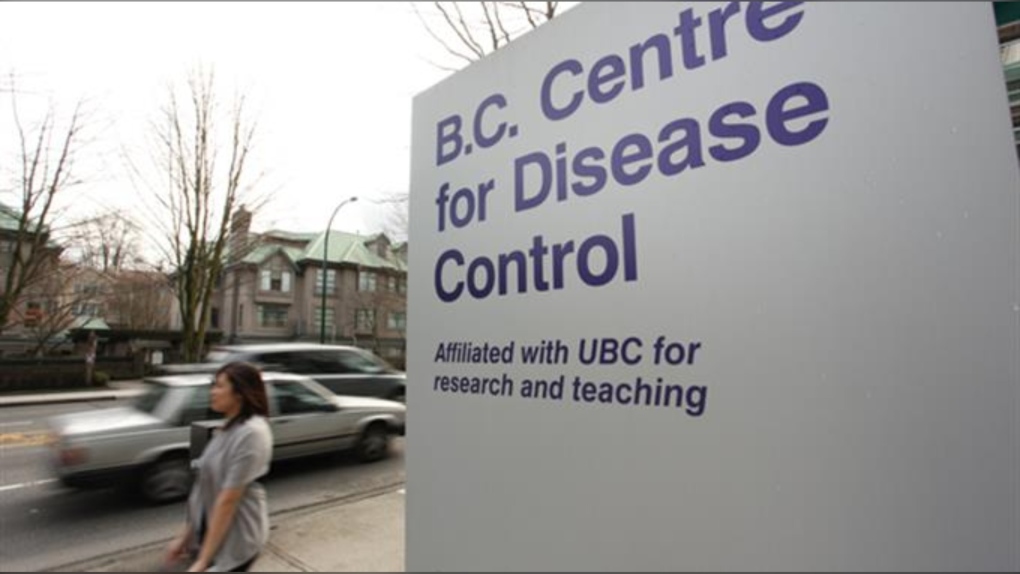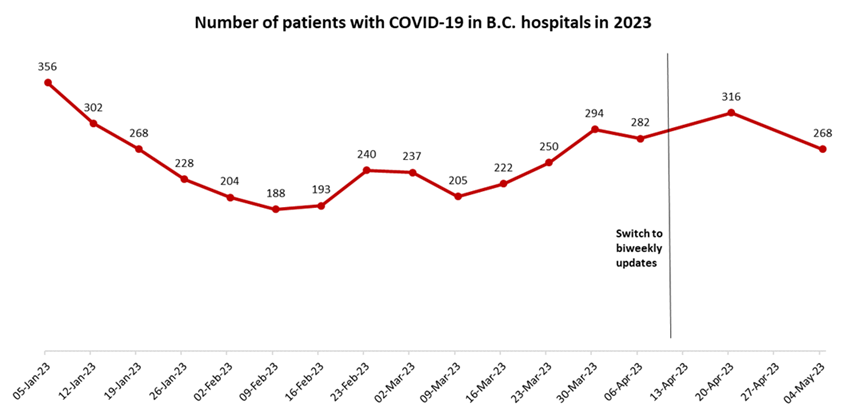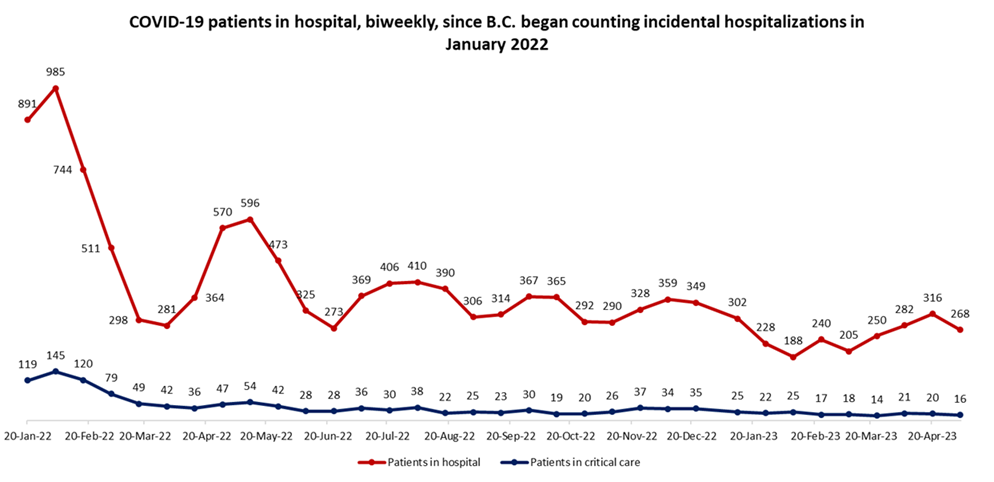BCCDC begins accounting for COVID-19 reinfections as frequency of updates reduced
 A sign at the BC Centre for Disease Control is seen in this photo from the BCCDC website.
A sign at the BC Centre for Disease Control is seen in this photo from the BCCDC website.
Six months after telling CTV News it was working to "better quantify" reinfections in its COVID-19 data, the B.C. Centre for Disease Control introduced a new counting system Thursday that will do just that.
The change comes as the BCCDC shifts to reporting COVID-19 data on a monthly basis, down from biweekly reports last month and weekly reports since April 2022.
Going forward, updates on infections, hospitalizations, deaths and other information related to COVID-19 will be published on the BCCDC website on the first Thursday of each month.
REINFECTIONS NOW COUNTED
Under the new system, the centre is tracking "infection episodes," rather than "cases" of COVID-19.
An infection episode, according to the BCCDC, is any time a person tests positive for COVID-19 on a lab-based test that is not within 30 days of a previous positive test.
This means a person who tested positive in the early days of the pandemic, recovered, and contracted the disease again this week will be counted as two separate infection episodes. Before Thursday's change, a person in that scenario would only be counted as a single case of COVID-19, because the definition of a case was tied to a person's first positive test.
In its announcement of the change, the BCCDC notes that the infection episode count still only includes lab-based tests funded by the provincial Medical Services Plan, meaning the vast majority of people who catch COVID-19 in the province will not be counted, as has long been the case.
"Due to a targeted testing strategy primarily aimed to inform patient care, the system will not capture all COVID-19 infections in the B.C. population," the BCCDC's statement reads.
"Positive results through rapid antigen tests (RAT), which became available in December 2021, are not reported to public health. While the surveillance system may not capture all COVID-19 infections, the system is able to monitor changes over time."
MONTHLY DATA UPDATES
On Thursday, the BCCDC reported that 636 "infection episodes" had been confirmed during the week of April 23 to 29.
The previous week – April 16 to 22 – saw 530 new lab-confirmed cases of COVID-19, under the old definition that excluded reinfections.
The BCCDC says direct comparisons between pre- and post-transition numbers should not be made, but a graph in its release shows "infection episodes" have generally trended higher than "cases" since April 2022.
The change in definitions also affects data on new hospital admissions, critical care admissions and deaths, though the centre's statement notes the effect is not particularly dramatic.
"One of the reasons why the impact of this system transition is small is because the vast majority of infections in B.C. are not captured through lab testing and lab testing generally reflects patients tested in health-care settings," the BCCDC said.
"Another reason is that for the vast majority of people who are hospitalized or die and have a positive COVID-19 test, it is their first test in the lab system."
There were 175 new hospital admissions for COVID-19 during the week of April 23 to 29, essentially unchanged from the previous week's 172, despite the transition to the new system.
The number of patients currently in hospital – which is different from the number of new admissions for a given week – is unaffected by the switch to counting infection episodes, the count of current hospitalizations has always been based on patients' latest tests.
As of Thursday, there were 268 people in hospital with COVID-19, a figure that includes both those with serious illness requiring hospital care and those who were hospitalized for some other reason and tested positive incidentally.
The latest total is the lowest reported since March 23, though there were only two updates in April because the BCCDC switched to biweekly reporting.
 The number of people in hospital with COVID-19 in B.C. in 2023, as reported by the BCCDC, is shown. (CTV)
The number of people in hospital with COVID-19 in B.C. in 2023, as reported by the BCCDC, is shown. (CTV)
The current hospitalization total is on the low end relative to where it has been since the BCCDC began including incidental hospitalizations in its count in January 2022.
 The number of patients in B.C. hospitals with COVID-19 is shown, on a biweekly basis, since the province began including incidental hospitalizations in its total in January 2022. (CTV)
The number of patients in B.C. hospitals with COVID-19 is shown, on a biweekly basis, since the province began including incidental hospitalizations in its total in January 2022. (CTV)
Thursday's update is the last one the BCCDC will be releasing until June 1.
CTVNews.ca Top Stories

B.C. tenants evicted for landlord's use after refusing large rent increase to take over neighbouring suite
Ashley Dickey and her mother rented part of the same Coquitlam duplex in three different decades under three different landlords.
Mountain guide dies after falling into a crevasse in Banff National Park
A man who fell into a crevasse while leading a backcountry ski group deep in the Canadian Rockies has died.
Expert warns of food consumption habits amid rising prices
A new survey by Dalhousie University's Agri-Food Analytics Lab asked Canadians about their food consumption habits amid rising prices.
MPP Sarah Jama asked to leave Ontario legislature for wearing keffiyeh
MPP Sarah Jama was asked to leave the Legislative Assembly of Ontario by House Speaker Ted Arnott on Thursday for wearing a keffiyeh, a garment which has been banned at Queen’s Park.
Charlie Woods, son of Tiger, shoots 81 in U.S. Open qualifier
Charlie Woods failed to advance in a U.S. Open local qualifying event Thursday, shooting a 9-over 81 at Legacy Golf & Tennis Club.
Ex-tabloid publisher testifies he scooped up possibly damaging tales to shield his old friend Trump
As Donald Trump was running for president in 2016, his old friend at the National Enquirer was scooping up potentially damaging stories about the candidate and paying out tens of thousands of dollars to keep them from the public eye.
Here's why provinces aren't following Saskatchewan's lead on the carbon tax home heating fight
After Prime Minister Justin Trudeau said the federal government would still send Canada Carbon Rebate cheques to Saskatchewan residents, despite Saskatchewan Premier Scott Moe's decision to stop collecting the carbon tax on natural gas or home heating, questions were raised about whether other provinces would follow suit. CTV News reached out across the country and here's what we found out.
Montreal actress calls Weinstein ruling 'discouraging' but not surprising
A Montreal actress, who has previously detailed incidents she had with disgraced Hollywood producer Harvey Weinstein, says a New York Court of Appeals decision overturning his 2020 rape conviction is 'discouraging' but not surprising.
Caleb Williams, Jayden Daniels and Drake Maye make it four NFL drafts with quarterbacks going 1-3
Caleb Williams is heading to the Windy City, aiming to become the franchise quarterback Chicago has sought for decades.

































